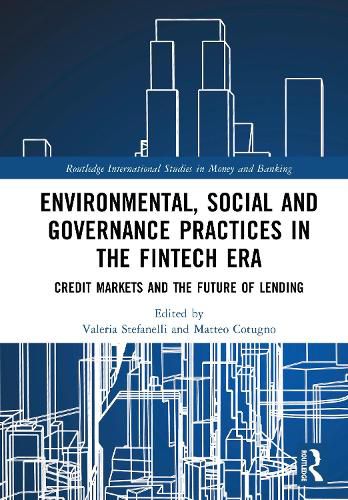Readings Newsletter
Become a Readings Member to make your shopping experience even easier.
Sign in or sign up for free!
You’re not far away from qualifying for FREE standard shipping within Australia
You’ve qualified for FREE standard shipping within Australia
The cart is loading…






In the Twin Transition era, digital technologies and Environmental, Social, and Governance (ESG) paradigms are changing the dynamics of the financial industry in terms of the operators involved and the service models addressed to customers.
This book provides a comprehensive analysis of the interplay between advanced technologies, such as artificial intelligence, blockchain, and machine learning, and the rising importance of Environmental, Social, and Governance (ESG) factors in the financial sector. Thus, it investigates how these twin transitions - digitalization processes and ESG practices - affect credit allocation mechanisms, redefine the roles of traditional financial institutions and alternative finance platforms, and influence the transparency and efficiency of financial markets.
The book adopts an interdisciplinary approach and employs a mixed-methods methodology, combining theoretical models, systematic literature reviews, and empirical analyses to explore jointly, the effect of digitalization and sustainability on financial systems. It addresses several topics, such as the rise of FinTech and crowdfunding platforms, and the integration of ESG criteria into credit risk assessment. Further, it examines the practical challenges faced by financial operators, including information asymmetry, credit risk disclosure, and the impact of ESG integration on financial performance. The book's relevance, originality and contribution to the reference field of literature is further enhanced by the empirical cross-country comparisons and the use of alternative quantitative methods such as multi-criteria decision analysis (MCDA).
The book provides valuable insights for academics, researchers, practitioners, and policymakers, offering a comprehensive understanding of the challenges and opportunities posed by these twin transformative forces - digitalization and sustainability - in the financial sector.
$9.00 standard shipping within Australia
FREE standard shipping within Australia for orders over $100.00
Express & International shipping calculated at checkout
In the Twin Transition era, digital technologies and Environmental, Social, and Governance (ESG) paradigms are changing the dynamics of the financial industry in terms of the operators involved and the service models addressed to customers.
This book provides a comprehensive analysis of the interplay between advanced technologies, such as artificial intelligence, blockchain, and machine learning, and the rising importance of Environmental, Social, and Governance (ESG) factors in the financial sector. Thus, it investigates how these twin transitions - digitalization processes and ESG practices - affect credit allocation mechanisms, redefine the roles of traditional financial institutions and alternative finance platforms, and influence the transparency and efficiency of financial markets.
The book adopts an interdisciplinary approach and employs a mixed-methods methodology, combining theoretical models, systematic literature reviews, and empirical analyses to explore jointly, the effect of digitalization and sustainability on financial systems. It addresses several topics, such as the rise of FinTech and crowdfunding platforms, and the integration of ESG criteria into credit risk assessment. Further, it examines the practical challenges faced by financial operators, including information asymmetry, credit risk disclosure, and the impact of ESG integration on financial performance. The book's relevance, originality and contribution to the reference field of literature is further enhanced by the empirical cross-country comparisons and the use of alternative quantitative methods such as multi-criteria decision analysis (MCDA).
The book provides valuable insights for academics, researchers, practitioners, and policymakers, offering a comprehensive understanding of the challenges and opportunities posed by these twin transformative forces - digitalization and sustainability - in the financial sector.